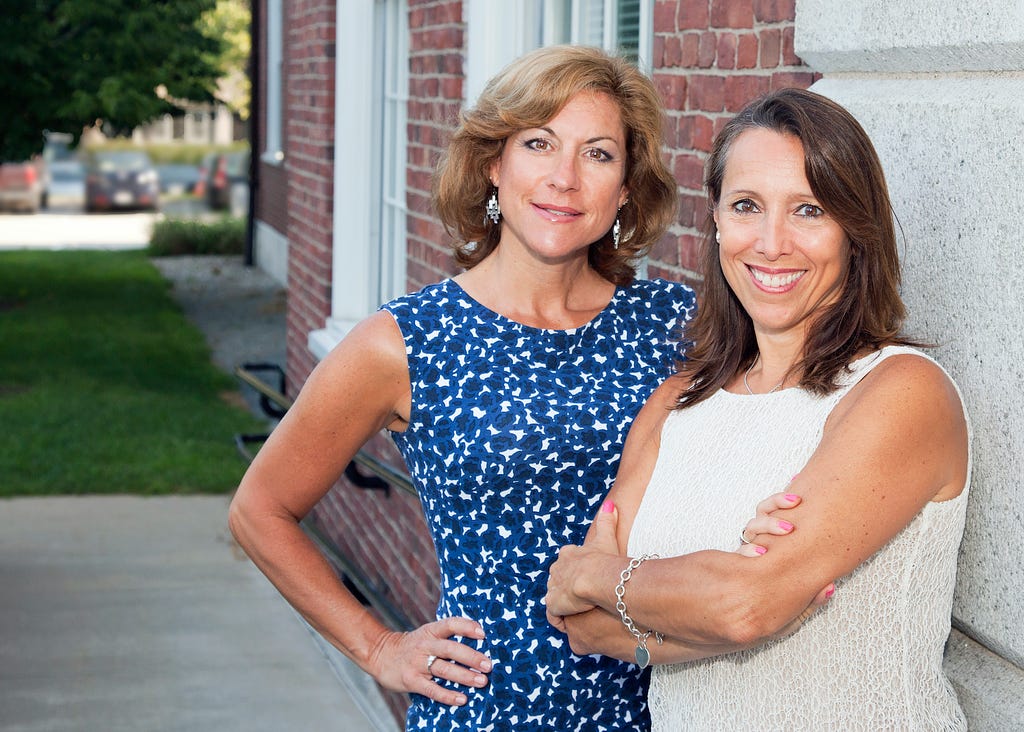Female Disruptors: Kirsten Lambert of Beantown Bedding On The Three Things You Need To Shake Up Your Industry

Kill it in the niche. It’s easy to be tempted by the deluge of opportunities that arise when starting a business. Thanks to an unexpected wave of media coverage, we were pulled into retail and wholesale distribution right out of the gate. As a team of two with a bare bones budget, we were spread thin. An advisor had cautioned that we “kill it in the niche” first. He recommended a grassroots initiative in our hometown of Boston, home to many of the nation’s top colleges where our linens had gained traction for orientations and summer events. It was good advice that we didn’t take. It’s easier to do something really well in a bubble and scale it, than to convert the masses all at once.
As a part of our series about strong women leaders who are shaking things up in their industry, I had the pleasure of interviewing Kirsten Lambert.
Kirsten is CEO of Beantown Bedding®, the Boston startup that introduced Laundry-Free Linens®. She and her co-founder, Joan Ripple, turned a college care package idea for their kids into an industry game-changer. Named among “17 Women to Watch in 2017,” their biodegradable bedding has been recognized as “visionary” by industry professionals, international media, and innovation-loving celebrities.
Thank you so much for doing this with us! Before we dig in, our readers would like to get to know you a bit more. Can you tell us a bit about your “backstory”? What led you to this particular career path?
My co-founder Joan and I met when our children dated each other in high school. Once they went to college we learned that, like most college kids, they rarely took time to wash their dirty sheets. As moms, we were concerned about their health and wanted to find an easier way for them to have clean bedding. After more than a year of R&D, we developed a new kind of bed sheet that was convenient, comfortable and compostable. With our backgrounds in business, Joan’s in management consulting and mine in consumer research, we saw an opportunity to change the way people get clean sheets on and off campus. It’s a Swiffer-like concept for beds.
Can you tell our readers what it is about the work you’re doing that’s disruptive?
Beantown Bedding®’s Laundry-Free Linens® are disrupting the bedding industry with an easy and planet-friendly new way to get clean sheets. What started as a college time-saver grew into a go-to solution for hundreds of organizations in hospitality, healthcare and higher ed. These remarkably soft linens, made from eucalyptus, can be used for days or weeks and discarded or composted instead of laundering. The savings of time, water and energy appeals to consumers and businesses alike. It not only cuts out half of the steps involved with managing a linen service or laundry operation, but guarantees clean new sheets for every user. Now in light of COVID, hygiene and infection control are more important than ever.
Can you share a story about the funniest mistake you made when you were first starting? Can you tell us what lesson you learned from that?
There’s a funny radio commercial playing since COVID became part of our lives. It features two women having a conversation in gibberish, and the announcer explains that these are weird times and nothing makes sense. It reminds me of one of our first meetings when Joan and I were starting the business. A global transportation company reached out to discuss our shipping needs. We sat at a local Dunkin Donuts for the better part of an hour staring at two men who appeared to be speaking the same language as the women in the commercial; gibberish. Their tone indicated that they were asking questions, but we didn’t understand a single thing they said as they threw around acronyms like LTL, FCL, HTC and CBM. Once the coffee ran out, we ran out. It was a humbling experience, but serves as a good reminder of how far we’ve come.
We all need a little help along the journey. Who have been some of your mentors? Can you share a story about how they made an impact?
Some of the most meaningful guidance we received was from mentors we met through a global accelerator called MassChallenge. The highly regarded program provided access to world-class experts from academia, industry and government. We benefited from the wisdom of rock star founders, famous authors and revered CEO’s, esteemed professors and impressive investors. One notable mentor was one of the earliest employees at Facebook. As fascinating as his story was, his feedback felt a little harsh. Our first whiteboard session took place in a stylish suite in a swanky New England seaside town. I showed up with my daughter’s hand-me-down Mac from high school. We were rookie founders and it showed. When he asked about goals, we offered safe, achievable projections. He challenged us to expand our vision and own it, however aspirational it seemed at the time. It lit a fire. We began to reach higher and make a plan to get there. As it turned out, we far exceeded the goals written on the whiteboard that first day. Looking back, his advice was some of the most valuable we received.
In today’s parlance, being disruptive is usually a positive adjective. But is disrupting always good? When do we say the converse, that a system or structure has ‘withstood the test of time’? Can you articulate to our readers when disrupting an industry is positive, and when disrupting an industry is ‘not so positive’? Can you share some examples of what you mean?
I believe disruption in the context of innovation occurs precisely because there is room for improvement. By definition, a problem is being solved, but that doesn’t mean every outcome of the solution will be positive. Sometimes disruption is tainted by people with negative intentions. Ride-sharing services have improved safety and convenience in many ways, but there are people who use them to commit crimes. Unintentional consequences can also be less than positive, such as decreased social interaction due to the popularity of handheld devices. Even so, it shouldn’t keep us from continuing to innovate.
Can you share 3 of the best words of advice you’ve gotten along your journey? Please give a story or example for each.
- Kill it in the niche. It’s easy to be tempted by the deluge of opportunities that arise when starting a business. Thanks to an unexpected wave of media coverage, we were pulled into retail and wholesale distribution right out of the gate. As a team of two with a bare bones budget, we were spread thin. An advisor had cautioned that we “kill it in the niche” first. He recommended a grassroots initiative in our hometown of Boston, home to many of the nation’s top colleges where our linens had gained traction for orientations and summer events. It was good advice that we didn’t take. It’s easier to do something really well in a bubble and scale it, than to convert the masses all at once.
- Trust your gut. This was very nearly a company-killer for Beantown. We almost lost our business, because we trusted the advice of experts more than our own gut. It bit us hard when we delegated the sales organization to someone who was recommended by mentors, but set off our internal alarms. By the time we discovered the false reporting, sales had tanked and we lost the peak buying season. Although we eventually recovered, disaster could have been avoided if we had simply trusted our instincts. Lesson learned…painfully.
- Fail until you don’t. One of the most true maxims I’ve heard is, “I never lose. I only win or learn.” Perseverance served us well when we sat at a long conference table with executives from a national retailer and a prestigious university. After making our pitch and fielding a few polite questions, we read their silence and facial expressions as our cue to leave. As everyone awkwardly began to get up, I stayed seated and just kept talking. Joan was probably kicking me under the table, but whether cluelessly or comically, I talked until the lightbulb went off for one of them. His enthusiasm grew as he brought the others onboard to his great idea of placing the linens in the travel section instead of the bedding department. Our startup story, like most, includes countless disappointments, disasters and even deaths. Those failures not only make the successes seem sweeter, but keeping pushing us forward. It’s true that whatever doesn’t kill you makes you stronger.
We are sure you aren’t done. How are you going to shake things up next?
New products will pave the road to “help the world live laundry-free”. Working in conjunction with one of the country’s premiere hospitals on leading edge infection control measures, we’re designing a completely “eco-disposable” room.
In your opinion, what are the biggest challenges faced by ‘women disruptors’ that aren’t typically faced by their male counterparts?
After comparing notes with other female entrepreneurs, regardless of education or qualification, it seems that we’re not always taken as seriously. On occasion Joan and I have been asked if this is our full-time job, if we have other “hobbies”, or what our husbands think about our business. I suspect those questions aren’t asked of our male counterparts. While it’s insulting, tough skin is a job requirement for any entrepreneur.
Do you have a book, podcast, or talk that’s had a deep impact on your thinking? Can you share a story with us? Can you explain why it was so resonant with you?
I’ve turned to “The Hard Thing About Hard Things,” by Ben Horowitz time and time again. Startups are just hard, and it helps to know how other founders remained resilient. If the answer could be summed up in one word, I’d say it’s tenacity. My favorite quote from the book is, “Whenever I meet a successful CEO, I ask them how they did it…The great CEOs tend to be markedly consistent in their answers. They all say, ‘I didn’t quit’.”

Can you please give us your favorite “Life Lesson Quote”? Can you share how that was relevant to you in your life?
My dad often repeated a saying attributed to John Lydgate: “You can please some of the people all of the time, you can please all of the people some of the time, but you can’t please all of the people all of the time”. It’s exhausting and futile to try to please everyone. In any business, the most important person to please is the customer. It sounds simplistic and cliché, but if you can do that, everything else will follow. When customers are happy, investors are happy, employees are happy, and founders are happy.
You are a person of great influence. If you could inspire a movement that would bring the most amount of good to the most amount of people, what would that be? You never know what your idea can trigger. 🙂
Say No To Status Quo: Things, and by that I mean EVERY thing, can be better. Whether it’s easier, faster, more enjoyable or more efficient, less expensive or less painful, the status quo always has room for improvement. It doesn’t require a high tech innovation; just a little ingenuity. Simple step changes and thinking outside the box can be the first ripples of a tsunami.
How can our readers follow you online?
Facebook: https://www.facebook.com/pages/Beantown-Bedding-LLC/265401140172734?ref=hl
Instagram: https://www.instagram.com/beantownbedding/
Twitter: https://twitter.com/BeantownBedding
This was very inspiring. Thank you so much for joining us!
Female Disruptors: Kirsten Lambert of Beantown Bedding On The Three Things You Need To Shake Up… was originally published in Authority Magazine on Medium, where people are continuing the conversation by highlighting and responding to this story.

